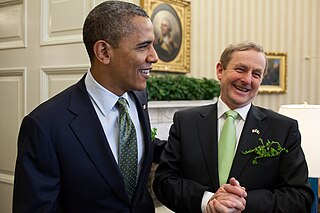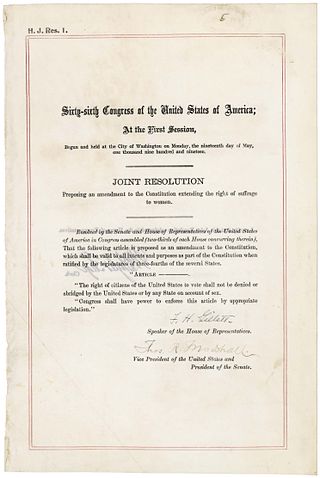Related Research Articles
Loyalty Day is observed on May 1 in the United States. It was proclaimed by President Dwight D. Eisenhower as a day for declaring loyalty to the United States of America and to acknowledge American history.

National holidays in the United States are 11 calendar dates designated by the U.S. federal government as official holidays. On these days non-essential national offices are closed although the employees receive pay.

The Authorization for Use of Military Force Against Iraq Resolution of 2002, informally known as the Iraq Resolution, is a joint resolution passed by the United States Congress in October 2002 as Public Law No. 107-243, authorizing the use of the United States Armed Forces against Saddam Hussein's Iraq government in what would be known as Operation Iraqi Freedom.
The Flag Desecration Amendment is a proposed addition to the Constitution of the United States that would allow the U.S. Congress to prohibit by statute and provide punishment for the physical "desecration" of the flag of the United States. The concept of flag desecration continues to provoke a heated debate over protecting a national symbol, preserving free speech, and upholding the liberty said to be represented by that national symbol. While the proposal almost didn’t pass by two-thirds majority required in the House of Representatives several times, it has passed the Senate by the same super-majority and has often not come to a vote in the Senate despite its introduction several times.

Lawrence H. Fountain was a Democratic U.S. representative from North Carolina from 1953 to 1983.

Irish Heritage Month is an annual observance originating in the United States, where it is known as Irish-American Heritage Month. It has received official recognition from governments in the United States and Canada. It was first celebrated by proclamation of the President and Congress in the United States to honor the achievements and contributions of Irish Americans. The heritage month is in March to coincide with Saint Patrick's Day, the Irish national holiday on March 17. Heritage Months are usually proclaimed by nations to celebrate centuries of contributions by a group to a country.
In February 1982, Senator William L. Armstrong and Congressman Carlos Moorhead sponsored Senate Joint Resolution 165, 96 Stat. 1211 a joint resolution authorizing and requesting the President to proclaim 1983 as the "Year of the Bible". In the United States, 1983 was designated as the national Year of the Bible by President Ronald Reagan by Proclamation 5018, made on February 3, 1983, at the annual National Prayer Breakfast. President Reagan was authorized and requested to so designate 1983 by Public Law 97-280 passed by Congress and approved on October 4, 1982.

Education and Sharing Day is a day established by the United States Congress in honor of the Rebbe, Rabbi Menachem Mendel Schneerson. It calls for increased focus on education, and recognizes the lifelong efforts of the Rebbe for education. Since 1978, Education & Sharing Day, USA, has been proclaimed by the president each year on the Rebbe's birthday on the Jewish calendar, 11 Nissan, which is four days before Passover and thus generally can fall between March 21 and April 21 on the Gregorian calendar.
Asian American, Native Hawaiian and Pacific Islander Heritage Month is observed in the United States during the month of May, and recognizes the contributions and influence of Asian Americans, Native Hawaiians and Pacific Islander Americans to the history, culture, and achievements of the United States.
Sun Day was designated by United States President Jimmy Carter, specifically devoted to advocacy for solar power, following a joint resolution by Congress, H.J.Res. 715 becoming Pub. L.Tooltip Public Law 95–253. It was modeled on the highly successful Earth Day of April 22, 1970. It was the idea of Denis Hayes, who also coordinated Earth Day in 1970. The date became an international event in 1994.
In the United States, National Ice Cream Month is celebrated each year in July, and National Ice Cream Day is celebrated on the third Sunday in July.
Grandparents' Day or National Grandparents' Day is a secular holiday celebrated in various countries; it is celebrated to show the bond between grandparents and grandchildren. It occurs on various days of the year, either as one holiday or sometimes as a separate Grandmother's Day and Grandfather's Day. It was celebrated for the first time in Poland in 1965.
The Day of Valor, officially known as Araw ng Kagitingan, is a national observance in the Philippines which commemorates the fall of Bataan to Japanese troops during World War II. The day is officially celebrated every April 9, the start of the Bataan Death March, although the date was moved on several occasions to avoid it from coinciding with the observance of the Holy Week in the country, especially the Easter Triduum and Easter Sunday, such as in 2009 and 2023.

Women's Equality Day is celebrated in the United States on August 26 to commemorate the 1920 adoption of the Nineteenth Amendment to the United States Constitution, which prohibits the states and the federal government from denying the right to vote to citizens of the United States on the basis of sex. It was first celebrated in 1971, designated by Congress in 1973, and is proclaimed each year by the United States President.
The Parental Rights Amendment to the United States Constitution is a proposed change to the United States Constitution. The amendment's advocates say that it will allow parents' rights to direct the upbringing of their children, protected from federal interference, and the United Nations Convention on the Rights of the Child. The Amendment was first proposed during the 110th Congress as House Joint Resolution 97 in July 2008, but no action was taken during that Congress. The Amendment has been described as a "wedge issue" and part of the culture wars.
National Good Neighbor Day is a national holiday in the United States celebrated on September 28.

The 118th United States Congress is the current meeting of the legislative branch of the United States federal government, composed of the United States Senate and the United States House of Representatives. It convened in Washington, D.C., on January 3, 2023, and will end on January 3, 2025, during the final two years of President Joe Biden's initial term.
The following is a timeline of the presidency of Lyndon B. Johnson from January 1, 1967, to December 31, 1967.
References
- ↑ 36 U.S.C. § 143
- ↑ "Proclamation 3315—Wright Brothers Day, 1959 | The American Presidency Project". www.presidency.ucsb.edu. Retrieved 1 September 2023.
- ↑ "Joint resolution designating the 17th day of December 1959 as "Wright Brothers Day" | H.J. Res. 513". www.Congress.gov. Retrieved 28 November 2023.
- ↑ "Joint resolution designating the 17th day of December 1961 as "Wright Brothers Day" | H.J. Res. 109". www.Congress.gov. Retrieved 28 November 2023.
- ↑ "Joint resolution designating the 17th day of December of each year as "Wright Brothers Day" | H.J. Res. 335". www.Congress.gov. Retrieved 28 November 2023.
- ↑ Reid, Channing (2024-01-06). "US Senate Says December 17 To Be Recognized As 'Wright Brothers Day'". Simple Flying. Retrieved 2024-04-02.
- ↑ House, The White (2023-12-15). "A Proclamation on Wright Brothers Day, 2023". The White House. Retrieved 2024-04-02.